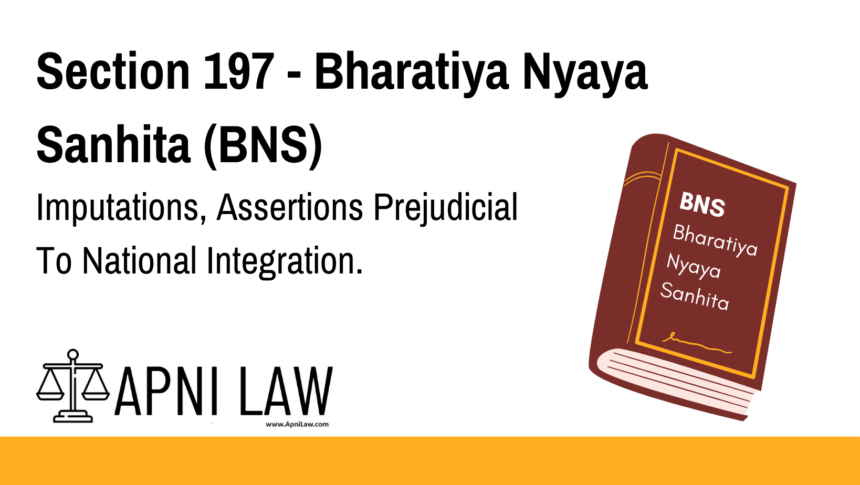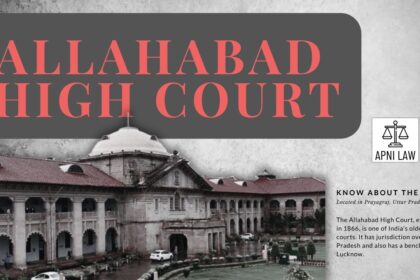Code: Section 197 BNS
(1) Whoever, by words either spoken or written or by signs or by visible
representations or through electronic communication or otherwise,—
(a) makes or publishes any imputation that any class of persons cannot, by
reason of their being members of any religious, racial, language or regional group or
caste or community, bear true faith and allegiance to the Constitution of India as by law
established or uphold the sovereignty and integrity of India; or
(b) asserts, counsels, advises, propagates or publishes that any class of persons
shall, by reason of their being members of any religious, racial, language or regional
group or caste or community, be denied, or deprived of their rights as citizens of India; or
(c) makes or publishes any assertion, counsel, plea or appeal concerning the
obligation of any class of persons, by reason of their being members of any religious,
racial, language or regional group or caste or community, and such assertion, counsel,
plea or appeal causes or is likely to cause disharmony or feelings of enmity or hatred or
ill-will between such members and other persons; or
(d) makes or publishes false or misleading information, jeopardising the
sovereignty, unity and integrity or security of India,
shall be punished with imprisonment which may extend to three years, or with fine, or with
both.
(2) Whoever commits an offence specified in sub-section (1) in any place of worship
or in any assembly engaged in the performance of religious worship or religious ceremonies,
shall be punished with imprisonment which may extend to five years and shall also be liable
to fine.
Explanation of Section 197 BNS
Section 197 of the Bharatiya Nyaya Sanhita (BNS), 2023, is designed to curb false statements, rumors, or assertions that threaten national integration and public order.
Key Elements of Section 197 BNS
- Modes of Offence:
- Spoken or written words
- Signs, symbols, or gestures
- Visible representations (posters, images, videos)
- Social media and digital content
- Punishment Classification:
- Basic offence (causing public fear or alarm) → Up to 3 years imprisonment, fine, or both
- If enmity between groups or national disintegration is caused → Up to 5 years imprisonment + fine (mandatory)
- Protected Interests:
- National unity and integrity
- Prevention of communal and regional conflicts
- Control of misinformation and public panic
Illustration of Section 197 BNS
Example 1: Spreading False News About a Terror Attack
A person circulates fake news about an imminent terrorist attack in a major city, creating panic and chaos among the public. Since this induces fear and disrupts public order, it falls under Section 197(1) BNS, with punishment up to 3 years imprisonment.
Example 2: Provocative Speech Against a Community
A leader falsely claims that a particular religious group is conspiring against the nation, leading to riots and public disorder. This act qualifies under Section 197(2) BNS, attracting up to 5 years imprisonment and fine.
Common Questions and Answers on Section 197 BNS
1. How is Section 197 BNS different from Section 196 BNS?
- Answer:
- Section 196 BNS deals with promoting enmity between groups on religious, linguistic, or racial grounds.
- Section 197 BNS focuses on assertions that disrupt national integrity and spread fear among the public.
2. Is Section 197 BNS a cognizable offence?
- Answer:
- Basic offence under Section 197(1) BNS (causing fear or alarm) is bailable and non-cognizable.
- Offence under Section 197(2) BNS (if it disrupts national integration) is non-bailable and cognizable.
3. Can online content be prosecuted under Section 197 BNS?
- Answer: Yes, any misleading news, social media posts, YouTube videos, or WhatsApp forwards that spread fear or hatred against a community can attract punishment under Section 197 BNS.
4. What is the punishment for an offence under Section 197(2) BNS?
- Answer: If national unity is harmed or communal violence results, the offender faces up to 5 years in prison and a mandatory fine.
5. Can a journalist be charged under Section 197 BNS?
- Answer: Yes, if a journalist or media outlet intentionally spreads false information that disrupts national integration or public order, they can be held liable under Section 197 BNS.
Conclusion
Section 197 BNS is a crucial legal provision to prevent false propaganda, communal hatred, and threats to national integrity. It applies to verbal, written, symbolic, and digital content, ensuring public security and unity.
For more legal insights, visit ApniLaw today! 🚀








